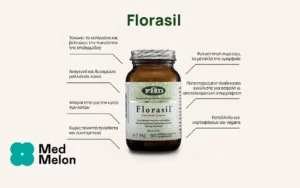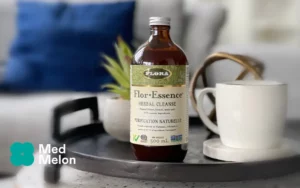Scientific Names of Pumpkin Seed Oil: Cucurbita pepo L. [Fam. Cucurbitaceae]
Forms:
Cold-pressed pumpkin seed oil from dried, lightly toasted pumpkin seeds
Traditional Usage:
– Antinflammatory
– Antioxidant
– Bed-wetting (in children)
– Benign Prostate Hyperplasia
– Essential Fatty Acid (EFA) Deficiency
– Lowering LDL Cholesterol
– Prostate Disorders
– Urinary System Conditions
– Vascular Disease
Overview:
Pumpkin seeds contain 30-50% oil composed mainly of fatty acids including palmitic, stearic, oleic and linoleic acids (these four fatty acids make up 98% of the total amount of fatty acids); tocopherols including beta-, gamma- and delta-tocopherol; and carotenoids including lutein and beta-carotene. Pumpkin seed oil also contains chlorophyll. Pumpkin seed oil contains: Lipids: Fatty acids, total saturated, 19.9%; 16_0=12.8%; 18_0=6.4%; Fatty acids, total monounsaturated 32.4%; 16_1=0.23%; oleic acid or 18_1=32.2%; Fatty acids, total polyunsaturated=47.7%; linoleic acid or 18_2=47.3%g; linolenic acid or 18_3=0.46%; Phytosterols (in free and bound forms) approximately 2g/100g; Cholesterol 0g/100g. The gamma-tocopherol content, which is about 5-10 times as much as that of alpha-tocopherol, varies over a broad range (41-620 mg/kg dry pumpkin seeds). For analysis, tocopherols and tocotrienols are extracted with hexane and analyzed by NP-HPLC/FLD with hexane/dioxan (96/4) as eluent, with fluorescence detection at 292/335 nm. Pumpkin seed oil used locally in Eritrea was found to be rich in oil (approximately 35%), protein (38%), alpha-tocoferols (3mg/100 g) and carbohydrate content (approximately 37%). The four dominant fatty acids found were: palmitic C16:0 (13.3%), stearic C18:0 (8.0%), oleic C18:1 (29.0%) and linoleic C18:2 (47.0%). The oil contains an appreciable amount of unsaturated fatty acids (78.0%) and was found to be a rich source of linoleic acid (47.0%). Variation in nutrient content exists between different cultivars and varieties of pumpkin.
Active Ingredients:
Pumpkin seeds contain 30-50% oil composed mainly of fatty acids including palmitic, stearic, oleic and linoleic acids (these four fatty acids make up 98% of the total amount of fatty acids); tocopherols including beta-, gamma- and delta-tocopherol; and carotenoids including lutein and beta-carotene. Pumpkin seed oil also contains chlorophyll. Pumpkin seed oil contains: Lipids: Fatty acids, total saturated, 19.9%; 16_0=12.8%; 18_0=6.4%; Fatty acids, total monounsaturated 32.4%; 16_1=0.23%; oleic acid or 18_1=32.2%; Fatty acids, total polyunsaturated=47.7%; linoleic acid or 18_2=47.3%g; linolenic acid or 18_3=0.46%; Phytosterols (in free and bound forms) approximately 2g/100g; Cholesterol 0g/100g. The gamma-tocopherol content, which is about 5-10 times as much as that of alpha-tocopherol, varies over a broad range (41-620 mg/kg dry pumpkin seeds). For analysis, tocopherols and tocotrienols are extracted with hexane and analyzed by NP-HPLC/FLD with hexane/dioxan (96/4) as eluent, with fluorescence detection at 292/335 nm. Pumpkin seed oil used locally in Eritrea was found to be rich in oil (approximately 35%), protein (38%), alpha-tocoferols (3mg/100 g) and carbohydrate content (approximately 37%). The four dominant fatty acids found were: palmitic C16:0 (13.3%), stearic C18:0 (8.0%), oleic C18:1 (29.0%) and linoleic C18:2 (47.0%). The oil contains an appreciable amount of unsaturated fatty acids (78.0%) and was found to be a rich source of linoleic acid (47.0%). Variation in nutrient content exists between different cultivars and varieties of pumpkin.
Suggested Amount:
Unless otherwise prescribed: Pumpkin seed oil can be used as a healthy culinary oil or can be taken as a source of essential fatty acids with a dosage of 1-2 tablespoons per day.
In the multicenter clinical trial noted above, patients received 1-2 capsules of a pumpkin seed extract per day for 12 weeks.
Drug Interactions:
None known.
Contraindications:
None known.
Side Effects:
None known.
References:
al-Zuhair H, Abd el-Fattah AA, Abd el Latif HA. 1997. Efficacy of simvastatin and pumpkin seed oil in the management of dietary-induced hypercholesterolemia. Pharmacol Res. 1997 May; 35(5): 403-8.
Fahim AT, Abd-el Fattah AA, Agha AM, Gad MZ. 1995. Effect of pumpkin seed oil on the level of free radical scavengers induced during adjuvant-arthritis in rats. Pharmacol Res. 1995 Jan; 31(1): 73-9.
Friederich M, Theurer C, Schiebel-Schlosser G. 2000. [Prosta Fink Forte capsules in the treatment of benign prostatic hyperplasia. Multicentric surveillance study in 2245 patients]. Forsch Komplementarmed Klass Naturheilkd. 2000 Aug; 7(4): 200-4. German.
Zhang X, Ouyang JZ, Zhang YS, Tayalla B, Zhou XC, Zhou SW. 1994. Effect of the extracts of pumpkin seeds on the urodynamics of rabbits: an experimental study. J Tongji Med Univ. 1994; 14(4): 235-8.
Zuhair HA, Abd El-Fattah AA, El-Sayed MI. 2000. Pumpkin-seed oil modulates the effect of felodipine and captopril in spontaneously hypertensive rats. Pharmacol Res. 2000 May; 41(5): 555-63.




